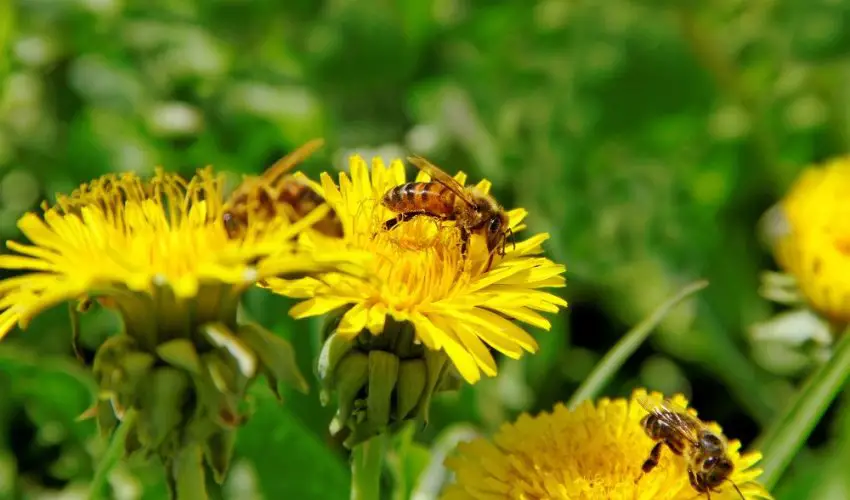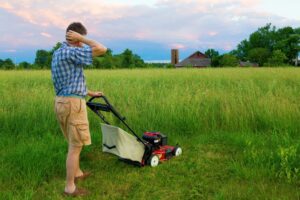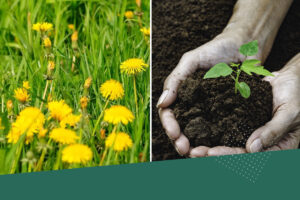Gardening teaches us that not all weeds deserve disdain; some are crucial allies for bees and pollinators, vital to our ecosystems. Through observation and ecological insight, I’ve learned to appreciate the role these plants play in supporting biodiversity.
Table of Contents
ToggleThis article aims to highlight the unexpected benefits of certain weeds, encouraging gardeners to embrace these natural helpers for the health of our pollinators and the vibrancy of our gardens.
Why Weeds are Important for Bees and Pollinators
Weeds like dandelions and clover are not merely nuisances; they are among the first to bloom in spring, providing essential nectar and pollen to bees when other food sources are scarce.
Their presence is a testament to a garden’s health, offering a haven for biodiversity amidst our manicured landscapes.
The Importance of Bees and Pollinators
Bees and other pollinators are crucial to our ecosystems and agriculture, facilitating the pollination of many crops and wild plants. This is vital for fruit, vegetable, and seed production, as well as preserving plant diversity. Yet, these essential creatures face significant threats from habitat loss, pesticides, and climate change, jeopardizing their existence and the ecosystems’ health.
The decline of pollinator populations impacts food security and ecological stability. Bees, for example, are key in pollinating about 75% of the world’s flowering plants and 35% of agricultural crops, supporting the production of numerous foods we depend on.
Acknowledging the significance of bees and pollinators is crucial for initiating protective measures.
Beneficial Weeds for Bees and Pollinators
In the quest to support our vital pollinators, certain weeds emerge as unsung heroes, offering food and shelter throughout the seasons. These plants, often overlooked or eradicated in traditional gardening, are in fact crucial resources for bees, butterflies, and other pollinating insects. Here, we explore some of these beneficial weeds and their importance to pollinator health and biodiversity.
-
Dandelion
Far from being mere lawn invaders, dandelions are a boon for early-spring pollinators. Their bright yellow flowers provide a significant source of nectar and pollen when few other plants are in bloom, offering crucial sustenance to bees as they emerge from winter dormancy.
-
Clover
Both white and red clover are not only nitrogen-fixers, enriching the soil without the need for chemical fertilizers, but they also offer a plentiful source of nectar for bees. Clover patches in lawns or garden edges can significantly support local bee populations.
-
Milkweed
Essential for the monarch butterfly, milkweed also attracts a variety of pollinators with its nectar-rich flowers. Planting milkweed contributes to the survival of monarch butterflies and supports a diverse range of bees and other insects.
-
Goldenrod
Often mistakenly blamed for hay fever, goldenrod is actually a vital late-season food source for bees, providing nectar and pollen as they prepare for winter. Its bright yellow flowers can support a wide array of pollinators in the fall.
-
Chickweed
This common “weed” is a ground cover that blooms early in the spring, offering nectar and pollen to bees at a critical time. Chickweed is also edible for humans, making it a dual-purpose plant in the garden.
By recognizing the value of these and other beneficial weeds, gardeners can make informed decisions about which plants to keep and which to manage. Cultivating a garden that includes these pollinator-friendly weeds not only supports local ecosystems but also contributes to global biodiversity, ensuring the health and survival of bees and pollinators worldwide.
Creating a Pollinator-Friendly Garden with Weeds
Embracing weeds in the garden as allies for bees and pollinators requires a shift in perspective and practice. By selectively allowing beneficial weeds to grow, gardeners can create vibrant, pollinator-friendly spaces that support biodiversity and ecological health. Here are strategies to integrate these plants harmoniously into your garden:
1. Selective Weeding
Before pulling out weeds, identify them. Determine if they are beneficial for pollinators and consider leaving them in place or managing their growth instead of eliminating them entirely.
It’s possible to maintain a beautiful garden while supporting pollinators. Designate areas where beneficial weeds can thrive, such as garden borders or unused corners.
2. Chemical-Free Gardening
Chemicals can harm beneficial insects and pollinators. Opt for natural pest control methods and embrace a more organic approach to gardening.It’s also important to use compost and other organic matter to enrich the soil, supporting both plant and pollinator health without the need for synthetic fertilizers.
3. Diverse Plantings
Incorporate a Variety of Flowers: Alongside beneficial weeds, plant native flowers, shrubs, and trees to provide a diverse range of nectar and pollen sources throughout the seasons.
Layered Planting: Create layers in your garden with ground covers, perennials, shrubs, and trees to offer a variety of habitats and food sources for different pollinator species.
5. Habitat Features
Allowing part of your garden to grow a little wild can create natural habitats for pollinators and other beneficial wildlife. Another way to attract pollinators and bees is to offer nesting sites by installing bee hotels or leaving dead wood and bare soil areas for ground-nesting species.
Creating a pollinator-friendly garden doesn’t mean letting your garden run wild with weeds, but rather making thoughtful choices about which plants to grow and how to manage them.
Conclusion
Embracing beneficial weeds in our gardens marks a commitment to ecological health and pollinator support. Recognizing the value of plants like dandelions, clover, and milkweed allows us to contribute to biodiversity and ecosystem resilience. This approach invites us to redefine beauty in our gardens, seeing the wildness as an integral part of nature’s intricate web.





